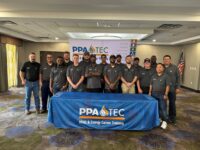Watts has announced the launch of its fourth and final quarterly sweepstakes of the year, themed “Smart & Connected Living.” This marks a significant milestone as Watts concludes its year-long celebration of the company’s 150th Anniversary. Starting October 1, the company invites its network to spread the word and build anticipation for an exciting lineup Read more
Industry News

Watts has announced the launch of its fourth and final quarterly sweepstakes of the year, themed “Smart & Connected Living.” This marks a significant milestone as Watts concludes its year-long celebration of the company’s 150th Anniversary.

Starting October 1, the company invites its network to spread the word and build anticipation for an exciting lineup of tech-savvy prizes.
In addition to the Q4 sweepstakes, water industry professionals are reminded to enter for a chance at the grand prize—an all-expenses-paid trip for two to Boston, MA.
How to Participate:
For more information, interested parties are encouraged to visit watts.com/150sweepstakes. For the official rules, including how to enter, eligibility requirements, prize package details, and how to enter at no-cost, please visit watts.com/150sweepstakesrules.

The global business training, coaching and implementation organization will be on hand at the annual event to discuss growth strategies for the home service industry Sept. 26, 2024 – CEO Warrior, a global business training, coaching and implementation organization for service business owners, will be on hand to discuss innovative growth strategies for the home service Read more
The global business training, coaching and implementation organization will be on hand at the annual event to discuss growth strategies for the home service industry
Sept. 26, 2024 – CEO Warrior, a global business training, coaching and implementation organization for service business owners, will be on hand to discuss innovative growth strategies for the home service industry at the Plumbing-Heating-Cooling Contractors National Association (PHCC) CONNECT 2024 conference in Birmingham, Alabama, Oct. 7-10. CEO Warrior will be at Booth No. 705 during the event.
“As leaders in instruction and continuous education in the skilled trades space, PHCC CONNECT is a must-attend event,” said CEO Warrior CEO Scott August. “This show attracts the best and brightest in the trades service sector. It also caters to leaders in these organizations who make the decisions on how to spend their training dollars. CEO Warrior’s value-added advantage is that we not only help leaders overcome the obstacles they face when trying to grow and scale their companies, but we also understand the skilled trades industry.”
August said most of CEO Warrior’s coaches and mentors came up through the residential and commercial service industry and have real-world experience. CEO Warrior Director of Sales and Marketing Sandy Papavero, Director of Business Development Caroline Moriarty and Director of Advisement Jason Noel, who each have more than 10 years’ experience helping business leaders, will be at the booth to answer questions.

CEO Warrior advisors Caroline Moriarty, Jason Noel and Sandy Papavero, clockwise from left, will be at Booth No. 705 at PHCC CONNECT 2024 Oct. 7-10 in Birmingham, Alabama, to discuss the importance of ongoing training and mentorship.
“Our advisors have built and managed successful home service companies and know this market and what it takes to compete in it,” August said. “As this conference shows, effective training is the cornerstone of any thriving home service business. At CEO Warrior, we believe that ongoing training not only helps employees improve in their roles, it also instills a mindset of continuous improvement and customer-centric service.”
CEO Warrior not only provides training and mentoring for business leaders in the home service and skilled trades industries, the company has also developed a partnership program with some of the industry’s leading product providers and service leaders to provide innovative products and meaningful knowledge to its members.
PHCC CONNECT 2024 is an annual conference hosted by PHCC, a national trade organization for plumbing and HVAC contractors and technicians and has more than 3,500 plumbing and HVACR open shop and union businesses and 65,000 technicians. Approximately 125 state and local association affiliates are part of PHCC’s chapter network.
This year’s PHCC CONNECT 2024 conference, held at the Birmingham-Jefferson Convention Complex, will feature more than 20 educational sessions covering topics like finance, business management, legislation, regulatory issues, influencer marketing, sales and marketing strategies, and the latest in artificial intelligence (AI) technology.
For more information about CEO Warrior and the training sessions offered to those in the home service industry, visit https://ceowarrior.com/.

HVAC professionals from across the U.S. honored with national recognition and $1,000 tool kit Malco Tools, one of the nation’s top manufacturers of high-quality tools for the HVAC and building construction industries, today announced the winners of its annual HVAC Trade-Pro of the Year Award program. The 2024 HVAC Trade-Pro of the Year Award recognizes outstanding Read more
HVAC professionals from across the U.S. honored with national recognition and $1,000 tool kit
Malco Tools, one of the nation’s top manufacturers of high-quality tools for the HVAC and building construction industries, today announced the winners of its annual HVAC Trade-Pro of the Year Award program. The 2024 HVAC Trade-Pro of the Year Award recognizes outstanding HVAC professionals for their dedication to the industry, commitment to safety and community involvement.

The 2024 program recognized five top HVAC contractors and technicians from across the U.S.:
- Scott Mapes, Owner, First Choice Comfort LLC/Hoppy Air, Lafayette, Indiana
- Robert Deeds, Journeyman Sheetmetal Worker, Sheetmetal Workers Local #7, Kalkaska, Michigan
- Brent Evans, Owner, Evans Heating & A/C, Princeton, NC
- Tom Langfeldt, Owner and Sole Proprietor, Peninsula Heating and Air LLC, Sturgeon Bay, Wisconsin
- Brandon McMullin, Service/Retro Fit and Finish Manager, Air Design Heating and Cooling, Murray, Utah
“It is always an honor to recognize the 2024 HVAC Trade-Pro of the Year winners for their commitment to their craft and the communities they support,” said Rich Benninghoff, president and CEO of Malco Tools. “These individuals represent the finest in the HVAC industry, sharing their skills and making a meaningful impact through their work and service.”
As a strong advocate for careers in skilled trades, Malco donates significant quantities of tools and apparel annually to a variety of educational programs, competitions and events nationwide. These include high school and post-secondary technical programs, apprenticeship contests and SkillsUSA conferences. Malco also runs the “Head of the Class” Student Recognition Program, which partners with education programs to celebrate top students and graduating classes in the HVAC/sheet metal and building construction fields.
For more information about Malco Tools, visit www.malcotools.com.

Students will pursue careers in the HVAC & Energy Industry Fourteen students have recently graduated from the PPATEC HVAC & Energy Professional Program. On September 13, the PPATEC (Pennsylvania Petroleum Association Technical Education Center) held a graduation ceremony for the students. The event featured spouses, parents, grandparents, and employers present to celebrate the student’s achievements Read more
Students will pursue careers in the HVAC & Energy Industry
Fourteen students have recently graduated from the PPATEC HVAC & Energy Professional Program. On September 13, the PPATEC (Pennsylvania Petroleum Association Technical Education Center) held a graduation ceremony for the students. The event featured spouses, parents, grandparents, and employers present to celebrate the student’s achievements as well as acknowledging their exciting new career choice.

The September 2024 HVAC & Energy Professional Program graduates included Anthony Morales (Pottsville, Schuylkill County), Christopher Falbo (Shippensburg, Cumberland County), Devon Spadt (Palmerton, Carbon County), Dominic Cruz (Harrisburg, Dauphin County), Dywan Blanding (Harrisburg, Dauphin County), Jaionne Miller (Lemoyne, Cumberland County), Josh Shore (Dover, York County), Juan Harris (Harrisburg, Dauphin County), Man Singh Magar (Harrisburg, Dauphin County), Marquan Whiting (Harrisburg, Dauphin County), Michael Mooney (New Oxford, Adams County), Pupsa Kafle (Harrisburg, Dauphin County), Tate Petrides (Aspers, Adams County), Walker Martin (East Earl, Lancaster County). Six of the fourteen graduates were $3,000 recipients of the Robert V. Boltz Scholarship Foundation.
The following students will be entering the workforce immediately upon graduation:
- Anthony Morales (accepted a position with Rick’s Refrigeration & Heating, Inc. prior to graduation)
- Devon Spadt (enrolled as an employee of RF Ohl while attending the program)
- Dominic Cruz (accepted a position with Home Climates prior to graduation)
- Dywan Blanding (accepted a position with HL Bowman prior to graduation)
- Juan Harris (accepted a position with Suburban Propane prior to graduation)
- Michael Mooney (accepted a position with Suburban Propane prior to graduation)
- Tate Petrides (accepted a position with Zimmerman Plumbing Heating & Air Conditioning prior to graduation)
- Walker Martin (accepted a position with Kauffman Gas prior to graduation)
PPATEC, an arm of the PA Petroleum Association (PPA), offers leading hands-on technical training solutions for the HVAC and energy industry. The PPA is a not-for-profit trade association representing 450+ energy stakeholders. PPATEC is a postsecondary entry-level career training institution licensed by the State Board of Private Licensing Schools and is approved by the VA to accept GI Bill® benefits.
In 2022, PPATEC launched its HVAC & Energy Professional Program, a 10-week, hands-on curriculum tailored to provide the skills needed to secure a job in the HVAC and energy industry. Since then, graduates of the program have routinely enjoyed multiple employment offers, often graduating on a Friday and going into a new career the following Monday.
According to Ted Harris, PPATEC’s Executive Vice President, there is a state-wide shortage of more than 2,000 HVAC and energy technicians — jobs with an average annual salary well above $50,000. PPATEC created its entry-level training program to help PPA members fill that pressing need. “We’re glad to play a role in preparing these — and other — young men and women for family sustaining careers in an in-demand field,” says Harris.
Candidates have multiple opportunities for financial support. Veterans can use GI Bill® benefits to defray the cost of the program. PPATEC also routinely offers scholarships to candidates. In addition, PPA members have an opportunity to sponsor a candidate entering the program. To learn more about PPATEC’s program, visit https://ppatec.com/.

Collaboration allows industry professionals to leverage comprehensive technology and authoritative expert insights to drive profitability and achieve business goals XOi, a leading provider of technician-focused technology solutions for commercial and residential field service companies, announces a new partnership with Powerhouse Consulting Group, an experienced team of software consultants in the skilled trades industry. Powerhouse Consulting Group Read more
Collaboration allows industry professionals to leverage comprehensive technology and authoritative expert insights to drive profitability and achieve business goals
XOi, a leading provider of technician-focused technology solutions for commercial and residential field service companies, announces a new partnership with Powerhouse Consulting Group, an experienced team of software consultants in the skilled trades industry.
Powerhouse Consulting Group drives software education and scalable growth to help leading service contractors implement and take full advantage of field service management tools. XOi offers technicians, contractors, manufacturers, suppliers, and end customers a single authoritative technology solution for the entire lifecycle of equipment.
The partnership connects XOi’s comprehensive technology with Powerhouse Consulting Group’s expert training and insights, ensuring field service professionals are equipped with the vital resources they need for the jobsite.
“XOi is ecstatic to work with Powerhouse Consulting Group to provide tools and resources for the skilled trades community,” said XOi Director of Partnerships Amanda Harp. “Their team’s knowledge and devotion to each client are unmatched, and the clear path of success they lay out provides market differentiation and a roadmap for best-in-class software implementation and optimization. Powerhouse’s team consistently brings technology and people together to achieve common goals and reach new standards of excellence.”
By partnering with XOi, Powerhouse Consulting Group is broadening opportunities to provide a complete tech stack in the field service industry. Through data consistency, clear communication, field enablement connectivity, and interoperability, technicians can deliver exceptional customer service in the field and contractors can achieve their business goals.
“Powerhouse Consulting Group has consistently recommended XOi’s technology to contractors to enhance their operational efficiency through technician-focused software solutions,” said Jenny Benbrook, founder and CEO of Powerhouse Consulting Group. “Our partnership with XOi solidifies our commitment to identifying, implementing, and consulting on advanced tools that significantly boost a contractor’s profitability.”
XOi provides field service contractors and their teams with the premier tool for managing and leveraging data from current jobs as well as historical projects, including powerful data collection, virtual support and mentoring, and real, actionable insights. For more information about XOi, visit https://xoi.io.
